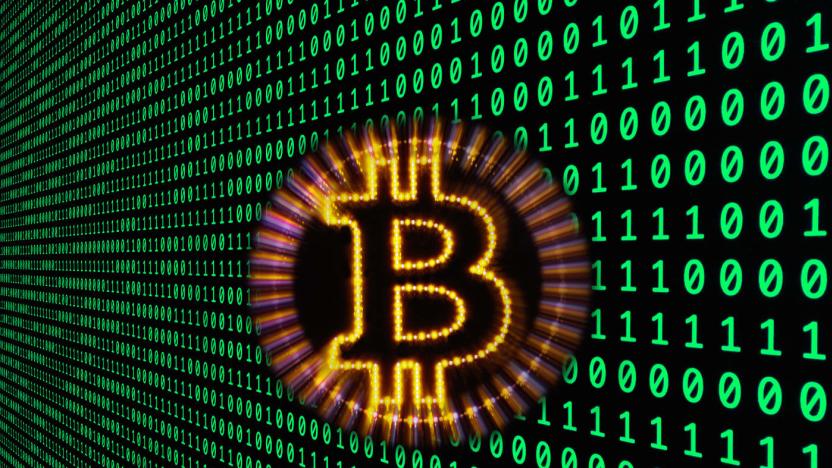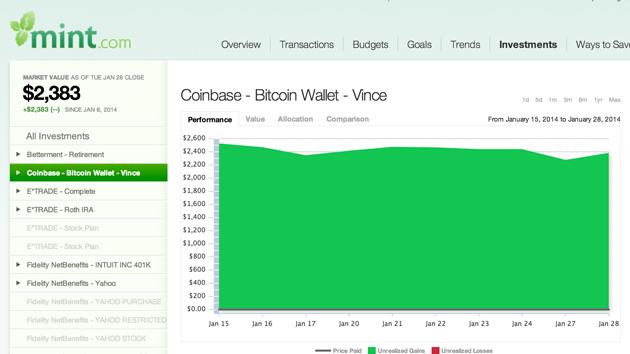bitcoins
Latest

Australia to auction off confiscated bitcoins this June
Australia has plans to sell off a considerable amount of bitcoins, the cryptocurrency favored by shady online folk, this June. 24,518 bitcoins confiscated by police will be auctioned off by financial services firm Ernst and Young in 2,000 blocks, an amount that equals just over a million US dollars given the current conversion rate. Australian authorities wouldn't specify where the bitcoins come from other than to say it was in conjunction with a crime. However, as the BBC points out, reports from 2013 indicate a similar quantity of bitcoins were seized in an online drug bust in Victoria. The upcoming auction will be open to bidders worldwide and could help set a precedent legalizing the currency for use in Australia, where it's still undergoing regulatory approval.

US Marshals to auction last remaining Bitcoins seized from Silk Road
Here's your last chance to grab a chunk of those bitcoins authorities seized when they arrested Silk Road founder Ross Ulbricht. On November 5th, the US Marshals will be auctioning off 44,341 bitcoins -- around $10.7 million worth -- from 8AM to 2PM EST. The bitcoins will be sold in 21 chunks of 2,000 each, along with a single block containing 2,341 BTC. Note that you can't just show up during the online auction and bid: you need to fill out a bidder registration form and email it to the Marshals by November 2nd. The agency will then notify the winners on November 6th.

New York wants Bitcoin exchanges to be heavily regulated
Popularity just isn't easy. That's something cryptocurrencies, like Bitcoin, are starting to grasp. Yes, they're now being accepted as a formal method of payment by more and more places, but some government entities still can't figure out how to treat them properly, particularly in the US. Case in point: the state of New York, which is proposing that companies exchanging virtual currency with consumers go through a regulatory process. BitLicense, a plan that's been in the works for nearly a year, would require these cryptocurrency banks to verify the identity of customers and, in some cases, ask for more information from "high-risk customers, high-volume accounts, or accounts on which a suspicious activity report has been filed." But that's not necessarily a bad thing, not for everyone anyway. "These regulations include provisions to help safeguard customer assets, protect against cyber hacking, and prevent the abuse of virtual currencies for illegal activity, such as money laundering." Benjamin M. Lawsky, superintendent of New York's Department of Financial Services, stated in a press release about to the proposal.

Mt. Gox revival threatens customer's remaining Bitcoins, says CEO
First, one of the world's largest Bitcoin exchanges went dark, then it filed for bankruptcy, suffered further hacking attacks and even faced a lawsuit. Now Mark Karpelès, Mt. Gox's CEO, tells the Wall Street Journal that he's liquidating what's left of the company assets to make ends meet. "As the company head, my mission was to protect customers and employees," he said in the interview, his first public appearance since Mt. Gox collapsed. "I'm deeply sorry. I'm frustrated with myself." A court-appointed trustee now holds all of the exchange's remaining funds and assets, and is preparing to auction off domain names owned by the companies to help repay creditors and keep Tibanne -- Karpelès' other business -- alive. This includes selling bitcoins.com and akb.com. Karpelès didn't say if mtgox.com itself would be up for sale, but he is worried about its future.

Bitcoin rival rewards you for archiving history instead of doing useless math
Other than generating lucre, Bitcoin mining does nothing but waste of time and energy. That's why researchers from Microsoft and the University of Maryland have developed "Permacoins" which reward you for actually doing something useful: backing up important data to your hard drives. For instance, you could earn crypto-coins by helping store, say, the 200TB US Library of Congress to your own disks. You wouldn't be able to cheat and use Dropbox or Google Drive thanks to an encrypted key, and data would be validated using a "proof of reliability" check. With enough participation, it would provide a safe, distributed backup and enable data to be accessed during outages -- like when the Library of Congress went offline during last year's shutdown. It's just a prototype for now, but researchers reckon a 100 Petabyte data pool could be created if users spent the same on storage that they have on pricy mining rigs.

Dish will soon let you pay your bill with bitcoins
While some companies are steering clear of Bitcoin, others, like Dish, are now getting ready to welcome the digital currency into the fold. Today, the satellite provider revealed that it plans to start accepting Bitcoin later this year, allowing customers to easily pay their bill online using virtual money. Dish is teaming up with Coinbase to handle the processing of these payments, which are expected to begin taking place during the third quarter of 2014. "We always want to deliver choice and convenience for our customers and that includes the method they use to pay their bills," Bernie Han, Dish executive VP and COO, stated in a company release. "Bitcoin is becoming a preferred way for some people to transact and we want to accommodate those individuals."

The Bitcoin drama continues: another exchange shuts down, while Overstock reports over $1 million in Bitcoin sales
It's been one big roller coaster ride for Bitcoin these past few weeks, with the Mt. Gox exchange shutting down and filing for bankruptcy following a large-scale hack, not to mention questions about the legality of the virtual currency. Just a week after Mt. Gox went dark, another exchange called Flexcoin is also shuttering, apparently due to hackers who robbed more than $600,000 in bitcoins. That amount pales in comparison to the $425 million stolen from Gox, but it points to ongoing security issues that fall outside of the Federal Reserve's regulation. In the midst of this bad news, online retailer Overstock announced that it's processed more than $1 million in purchases made with bitcoins. One of the first major companies to embrace the currency, the site has accepted Bitcoin since early January, and it reports that more than 4,000 -- mostly new -- customers have chosen this form of payment. Overstock CEO Patrick Byrne told The Wall Street Journal he expects purchases made with bitcoins to top $10 million this year, but the Mt. Gox (and, now, Flexcoin) hacking will likely have some customers and would-be Bitcoin users second-guessing the currency's safety. Bitcoin is a saga if there ever was one, so expect more news in the coming weeks.

Bing now shows how much your Bitcoin is worth in other currencies
While some may be opposed to the idea of Bitcoin, others are doing all they can to adjust to the recent digital currency rush. Today, Bing, in partnership with Coinbase, announced it has added support for Bitcoin within its currency-conversion tools. Simply put, you can now use Microsoft's search engine to see what the value of your new-age money is in, say, dollars, pesos, euros or any of the other 50-plus currencies Bing has indexed. And it's all done in real time, too. No Bitcoin? No problem -- there's nothing wrong with entering some random numbers for fun's sake.

Mint now lets you keep track of Bitcoins with its personal finance apps
Now that Bitcoin has taken root in daily financial transactions, those who fancy the digital currency need a way to easily keep an eye on the tally. Well, for the folks that meet that criteria, Mint now lets users keep track of transactions with the help of Coinbase. This means that Bitcoin Wallet figures can be viewed alongside other banking, credit card and investment accounts. The integration also automatically converts the account balance to US dollars to keep the mental math at a minimum.

Gambling MMO Dragon's Tale prepares for beta
Gambling? On the internet? Perish the thought! Or don't perish it, because eGenesis would like to invite you to give it a try. The maker of A Tale in the Desert announced that it will begin the beta for Dragon's Tale on July 12th. Dragon's Tale isn't your traditional internet casino, however. There are quests, leveling, a mentor system, and a political system similar to A Tale in the Desert. It looks as though there will be plenty of minigames that swing between luck and skill, including cow tipping, fishing, and maze running. Players can use credit cards and Bitcoins to gamble, and the client will be available on Windows, Linux, and OSX. Lead Designer Andrew Tepper hopes that Dragon's Tale will create a bonding experience between players: "The first thing that stuck me about online gambling today is that it's a pretty lonely experience, typically one player in a web browser, watching a 2-D slot machine. I've taken what I've learned in the last 15 years building MMOs and for the first time applied that to gambling. I've created an intensely social world where players can explore the game world together, share techniques, and rely on each other as they level up by completing gambling quests." [Source: eGenesis press release]

Compromised account leads to massive Bitcoin sell off, EFF reconsiders use of currency
Bitcoin, for those not aware, is a completely digital currency -- one where exchanges between individuals are largely anonymous and secured through cryptography, and one that has seen its hype-meter go off the charts in recent months. That, inevitably, has had some people waiting for a fall, and it took a big one this week. While things have since bounced back, the value of the currency on the so-called Mt. Gox exchange dropped from around $17.50 to just one cent in a matter of moments during the early hours of June 20th -- a drop that's since been attributed to a compromised account. Thanks to a daily withdrawal limit, however, that apparently only resulted in $1,000 actually being stolen, and a claims process has now been set up for those affected. While not directly related to the sell off, the Electronic Frontier Foundation (or EFF) also dealt a bit of a blow to the upstart currency this week, when it announced that it would no longer be accepting Bitcoin donations. According to the organization, that's both because it doesn't "fully understand the complex legal issues involved with creating a new currency system," and because it doesn't want its acceptance of Bitcoins misconstrued as an endorsement of Bitcoin. Head on past the break for an account of the aforementioned plunge as it happened. [Thanks, Zigmar; image: Wikipedia]








